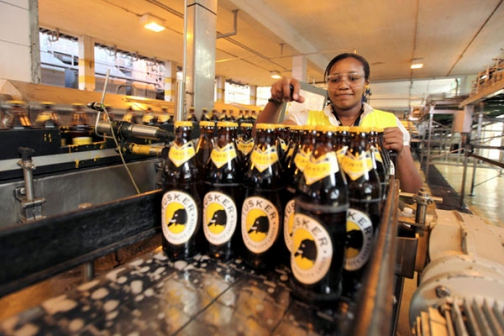In a landscape where regulatory changes can swiftly alter the course of businesses, East African Breweries Limited (EABL) finds itself grappling with the ramifications of an amendment to Sec 36 of the Excise Duty Act.
- The finance Act 2023 mandates that excise duty be paid within 24 hours of moving goods from the stockroom, a significant departure from the previous monthly remittance schedule.
- For a company of EABL’s stature and prominence in the region’s beverage industry, the regulatory tweak has sparked a series of operational and financial challenges. No stranger to compliance complexities,
- EABL has been forced to navigate the intricacies of this new requirement, reshaping its financial strategies to ensure adherence while safeguarding its bottom line.
The brewer’s stock begun tanking on Friday Jan 26th, immediately after the listed Diageo-owned conglomerate released its 2023 financial results. Its profits declined by 22 per cent, despite its volumes and sales increasing. The reason behind the dip, MD and CEO Jane Karuku said, was “… increased costs of inputs, currency devaluation and rising interest rates.”
At KShs. 104.50, the stock price was the lowest in decades, even before it dipped further by 4.31% on Monday 29th to KShs. 100.
In Q1 2009, the stock was quoted at KShs 123.45. The previous day’s price was KShs 118.25, which was a mild spike from a relatively stable range since it begun recovering on December 22nd from a dip that begun in late July 2023, following the Finance Act 2024, when it was priced at KShs 164.
- The stock reached its high in 2013, when it was quoted at 341.02, but the height was short-lived.
- Despite some highs since, it has not been quoted above 300 since April-June 2015, according to stock price data on its website.
- The recent spike has been triggered by tough market conditions, with investors choosing to bet against a more favourable tax environment in the short term.
Although the company’s tax burden remained relatively unchanged by the new law, the law changed the excise duty cycle to 24hrs, placing significant pressure on its liquidity and working capital.
The company’s foreign exchange losses spiked by more than 1, 100% in 2023, shooting from KShs. 209 million in 2022 to KShs. 2.3bn in 2023. This is primarily because of the rapid depreciation of the shilling. But another issue is that the mess in the sugar sector means that the brewer now has to import a significant proportion of its ethanol.
Why it Matters
Founded as Kenya Breweries in 1922, the century-old brewer is one of the NSE’s blue chip stocks, and one of Kenya’s biggest sources of excise duty.
It’s woes, and the subsequent investor reaction, is indicative of the effect of macroeconomic and tax policies on manufacturers. It is more likely than not that its share price will recover in the medium term. In the short term, there are few indications that there will be any shifts to, for example, ease liquidity pressure on excise duty payers.
Under the revised tax remittance timeline, EABL has been compelled to reevaluate its cash flow management practices. The company, renowned for its extensive distribution network with over 250,000 distributors, operates primarily on a credit basis, with payments typically received within 30 to 45 days.
- This entrenched operational model, while conducive to market penetration and sales volume, has become a double-edged sword in the face of tax obligations.
- To meet the stringent tax remittance deadlines, EABL has resorted to short-term loans from commercial banks to pay tax authorities promptly.
- This proactive approach aims to circumvent the accrual of interest.
But, the influx of borrowed capital to settle tax dues has exerted pressure on EABL’s working capital, disrupting the delicate equilibrium between liquidity management and operational sustainability. The resultant strain on financial resources has manifested in the company’s business strategy, and eventually on its stock price.
In response to the diminished profitability, EABL has opted to slash dividends from 3.75 shillings per share to a reduced figure of 1.0 shilling per share, a testament to the far-reaching implications of regulatory shifts on corporate governance and investor expectations.
EABL’s Chief Financial Officer (CFO), Risper Ohaga, has described the situation as “very problematic” and “…a zero sum game” from both a compliance and cash flow perspective.
As EABL navigates the turbulence waters of regulatory compliance and financial resilience, its experience serves as a cautionary tale for businesses operating in regulated industries. With regulatory landscapes prone to evolution, adaptability and foresight emerge as indispensable traits for corporate survival.
By remaining vigilant to regulatory nuances, fortifying financial management practices, and fostering agility in operational paradigms, businesses can navigate the labyrinth of regulatory change while safeguarding their financial vitality and long-term sustainability.




